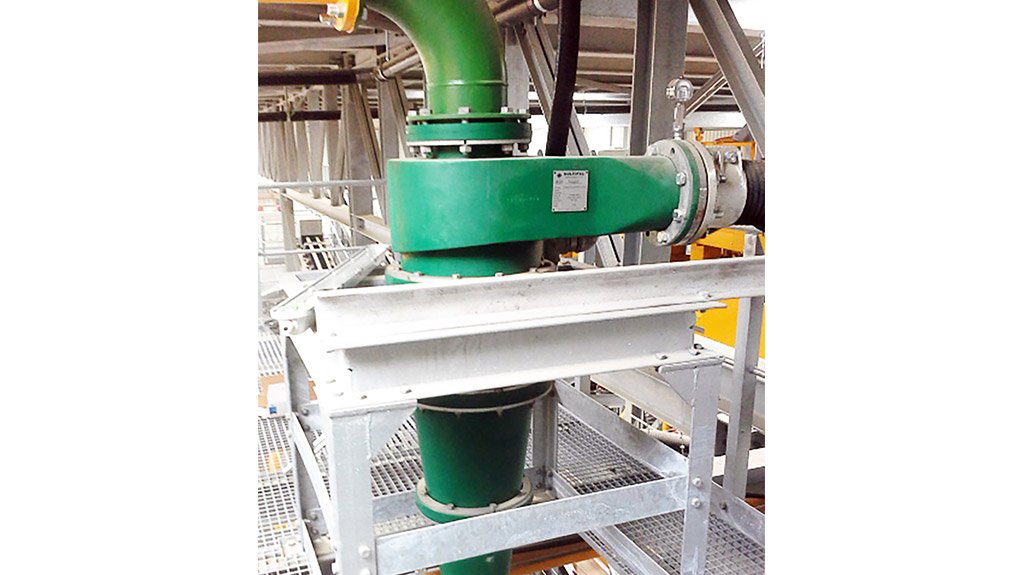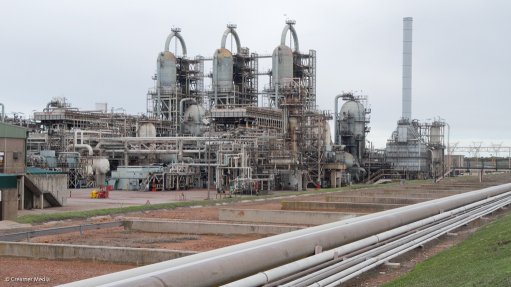Soil Decontamination In Europe Gets Help From Multotec
This article has been supplied as a media statement and is not written by Creamer Media. It may be available only for a limited time on this website.
Multotec hydrocyclones and spiral concentrators are being applied in Europe to address the growing demand for the rehabilitation of contaminated land. The application of the solution is via Multotec’s European agent of 25 years’ standing, Bernd Bohle, Dipl. –Ing of Bohle Ing. Beratung.
According to Bohle, pollution and soil contamination have become leading environmental issues for most European countries in recent years, with well over 300,000 sites thought to be affected by this problem.
In a recent application, Multotec commissioned its equipment in a modern soil washing plant in the Italian speaking part of Switzerland. This also involved the training of staff in both German and Italian, through collaboration with Bohle Ing. Beratung and Italian partner SST/4Sep sagl., Manual Nava.
“Treatment methods in Europe vary from the conventional engineering techniques to the use of alternative technologies for decontamination that use physical, chemical and biological reactions,” says Bohle. “These latter technologies – such as biological remediation, thermal treatment, vitrification, vacuum extraction, and soil washing – are growing in demand.”
He highlights that many of these technologies, especially soil washing, have been successfully demonstrated and applied on an industrial scale in countries like Germany, Switzerland and the Netherlands.
“The largest markets – accounting for over 50% of the European Union total – are Germany and Switzerland,” he says. “The Netherlands and the UK are also significant, while the French and Italian markets are expected to grow rapidly by the end of the decade.”
The pressure is coming from more stringent regulations, he explains, which trigger the need for land decontamination when there is any planned development of a site, or where the spread of contamination is detected.
“Most of the soil cleaning techniques require on-site soil washing, where the material is treated to separate the contaminants from the soil before further naturalisation can take place,” he says.
It is here that the Multotec cyclones and spiral concentrators have come into their own. In particular, the spirals have been steadily incorporated into the process, for the separation of light and heavy fractions.
“In many instances, spills of contaminated hydrocarbons in industrial areas have been adsorbed over a period of time into the carboniferous phases of the soil. This is often a combination of coal, lignite, charcoal, tar and organic detritus,” says Bohle. “In such cases, removal of this material by physical means can allow the separation of the contaminated hydrocarbon fraction into a low density product for further treatment or disposal.”
In these applications, the use of spiral concentrators, with their flat angles as in large diameter coal spirals, can remove the low density material from the soil bulk. Other important applications include the removal of metallic matter, oxides, sulphides, carbonates and slags from contaminated soils in industrial sites such as former automobile scrapyards. Here, heavy mineral spirals with their pitch angles of 21 degrees can remove metallic matter from the soil.
At the BSH-TIB Mezzovico soil washing plant in Switzerland, Multotec’s large diameter coal spirals and its heavy mineral spirals are supporting the decontamination process at a rate of up to 70 tonnes per hour of solids.
The installation allows between 27 tonnes and 40 tonnes per hour of pre-screened material sized from zero to 1,8 mm to be pumped to a VV350-15-1 stacker cyclone with a capacity of up to 170 m3 per hour. The re-diluted underflow is fed by gravity to a spiral bank for lights decontamination. The heavy sand product is then pumped to a stacker cyclone of the same specification, with the re-diluted underflow reporting to a spiral bank for heavy particle removal.
Comments
Announcements
What's On
Subscribe to improve your user experience...
Option 1 (equivalent of R125 a month):
Receive a weekly copy of Creamer Media's Engineering News & Mining Weekly magazine
(print copy for those in South Africa and e-magazine for those outside of South Africa)
Receive daily email newsletters
Access to full search results
Access archive of magazine back copies
Access to Projects in Progress
Access to ONE Research Report of your choice in PDF format
Option 2 (equivalent of R375 a month):
All benefits from Option 1
PLUS
Access to Creamer Media's Research Channel Africa for ALL Research Reports, in PDF format, on various industrial and mining sectors
including Electricity; Water; Energy Transition; Hydrogen; Roads, Rail and Ports; Coal; Gold; Platinum; Battery Metals; etc.
Already a subscriber?
Forgotten your password?
Receive weekly copy of Creamer Media's Engineering News & Mining Weekly magazine (print copy for those in South Africa and e-magazine for those outside of South Africa)
➕
Recieve daily email newsletters
➕
Access to full search results
➕
Access archive of magazine back copies
➕
Access to Projects in Progress
➕
Access to ONE Research Report of your choice in PDF format
RESEARCH CHANNEL AFRICA
R4500 (equivalent of R375 a month)
SUBSCRIBEAll benefits from Option 1
➕
Access to Creamer Media's Research Channel Africa for ALL Research Reports on various industrial and mining sectors, in PDF format, including on:
Electricity
➕
Water
➕
Energy Transition
➕
Hydrogen
➕
Roads, Rail and Ports
➕
Coal
➕
Gold
➕
Platinum
➕
Battery Metals
➕
etc.
Receive all benefits from Option 1 or Option 2 delivered to numerous people at your company
➕
Multiple User names and Passwords for simultaneous log-ins
➕
Intranet integration access to all in your organisation





















